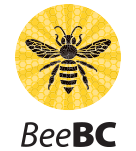TJ and Olivia applied for funding through the Bee BC Program to address biodiversity issues in bee forage on their 2-acre 'Vive Le Veg Farm,' which supplies fresh produce to over 25 restaurants in the Vancouver area. The aim of their project was to introduce a variety of flowering plants that bloom year-round, ensuring [...]

Pollinator Highway: Replenishing Bee Forage in the Kootenays
Christine Cooper2025-04-11T16:46:04+00:00The Elk Root Conservation Farm Society’s Pollinator Highway Project aimed to address the issue of declining native bee forage due to summer drought and wildfires by restoring disturbed landscapes with flowering vegetation. They restored a 300-metre stretch of highway and established six pollinator plots, beginning with the removal of invasive plant species. They employed solarization, [...]

Protecting Pollinators: Cataloging Bee Species in Vancouver Island Agriculture
Christine Cooper2025-04-11T16:45:36+00:00The Comox Valley Beekeepers Association recognized that common agricultural practices, such as pesticide use, tilling, weed removal and planting monocultures, harm bees. Since bee health is crucial for agriculture, our farming systems must better support the bees that pollinate our food. Currently, there is no baseline data on the bee species in Vancouver Island's [...]

Using Selective Breeding to Reduce Varroa Mite in Bees
Christine Cooper2025-04-11T16:44:52+00:00Neil Keeble, owner of Little Feat Apiaries and secretary of the British Columbian Bee Breeders Association rears local queens and nucleus hives to sell in Revelstoke. Varroa mites are the largest pathogenic threat to honeybee health and transmit viruses, such as deformed wing virus (DWV), that shorten bee lifespans and lead to colony collapse. [...]
Raising Local Queens
Christine Cooper2025-04-11T16:43:53+00:00Barbara Forster-Rickard is a hobby beekeeper with hives in East Vancouver and at Glimpse Lake, Nicola Plateau. Beekeepers in BC frequently import nucs, packages, and queens from regions such as New Zealand, Hawaii and Chile, where the climate differs significantly from BC's. Although these imported queens may thrive for a while, they often fail [...]

Capital Region Beekeepers’ Association Annual Equipment Sterilization Trip
Christine Cooper2024-04-05T15:51:15+00:00The South Vancouver Island region is a unique mix of urban and semi-urban environments. The area is home to several small-scale beekeeping operations within a small land area. As a result, pollinator forage areas are often shared. The Capital Region Beekeepers’ Association (CRBA) has noticed an increase in honeybee diseases like American Foulbrood likely [...]

Creating Biotechnical Varroa Control Method Resources for BC Beekeepers
Christine Cooper2024-04-05T15:50:15+00:00Varroa mites continue to plague beekeepers in BC resulting in colony losses, but groups like the Comox Valley Beekeepers Association continue to look for methods to reduce the mites. Previously effective methods like using chemicals such as Apivar are becoming less effective as the Varroa mites grow resistance. As part of their 2023/24 Bee [...]

Native BC Bee and Forage Plant Identification Project
Christine Cooper2024-04-05T15:48:53+00:00Many recognize the honey bee as a pollinator in British Columbia, however; the province is home to nearly 600 species of bees. The Native Bee Society of BC (NBSBC) is striving to collect more knowledge about the nearly 600 species of bees found in BC. With the success of their 2022/23 Bee BC project, [...]

Community Varroa Treatment Kits Prove Effective
Christine Cooper2024-04-11T15:17:07+00:00The BC Honey Producers Association (BCHPA) is helping smaller bee keeping operations address Varroa mites as part of their 2023/24 Bee BC project. For their project, the BCHPA created Oxalic Vaporizer supply kits to enable the borrowing of treatment equipment. The Oxalic Vaporizer treatment method has proven to be effective but comes at a [...]
Honey Bees Supplemented with Bee ‘Tea’
Christine Cooper2024-03-22T16:37:02+00:00Viewcrest Farms is a family-owned farm located in Mission, BC. In 2022, they began a Bee BC project that focused on monitoring for Varrora Mites and Nosema Spores and supplementing honey bees with sugar syrup infused with a herbal tea. Olena Zagoskina, co-owner of Viewcrest Farms, tested for Varrora Mites using the typical sugar [...]





